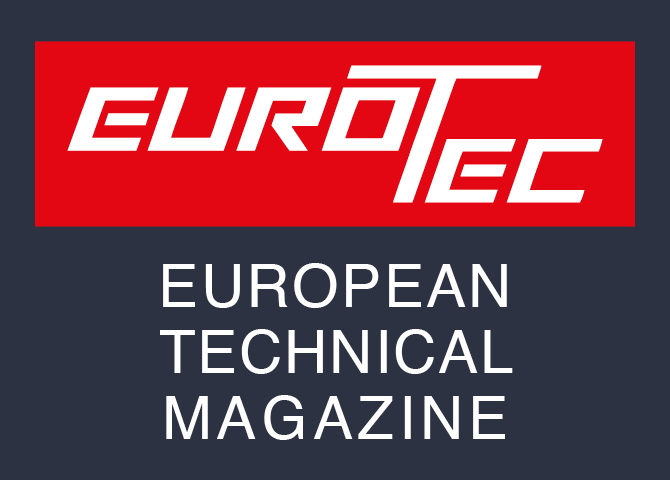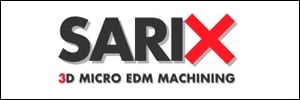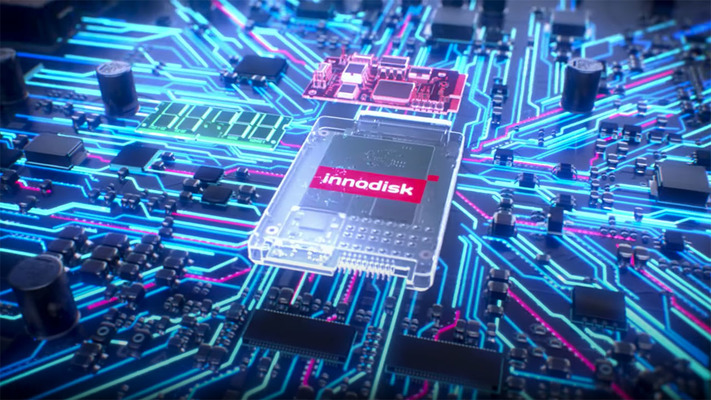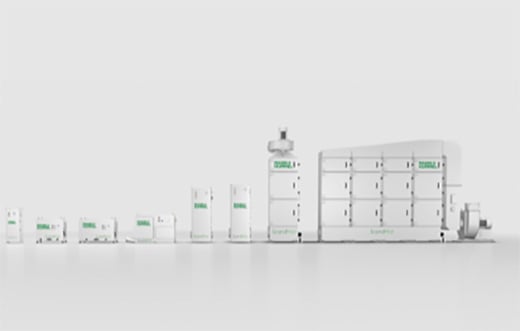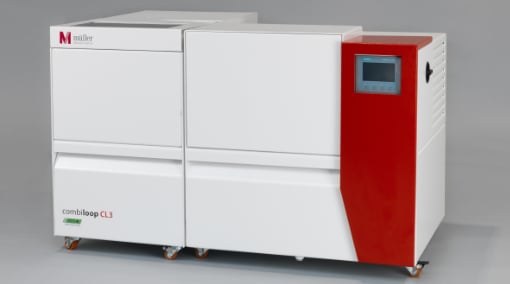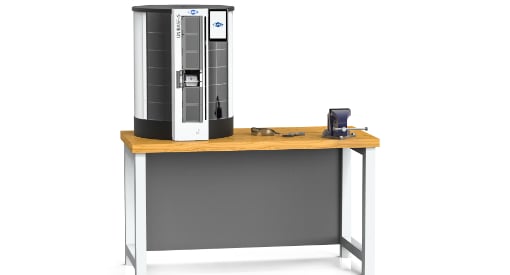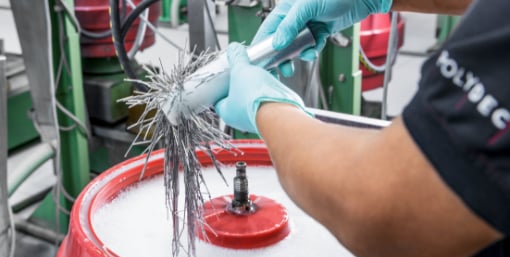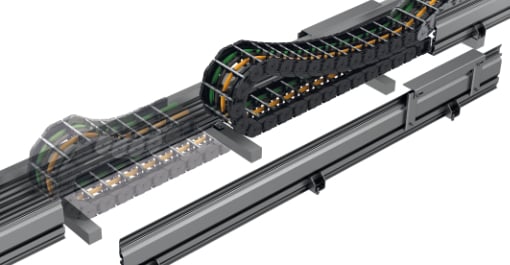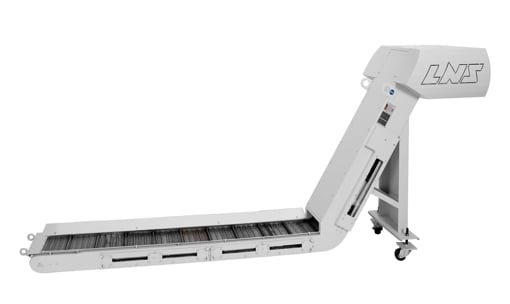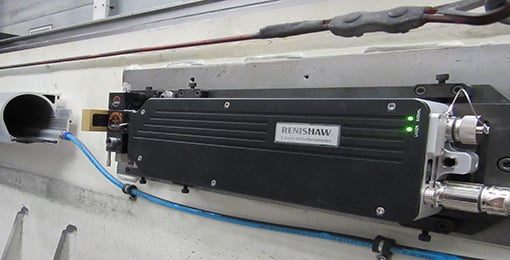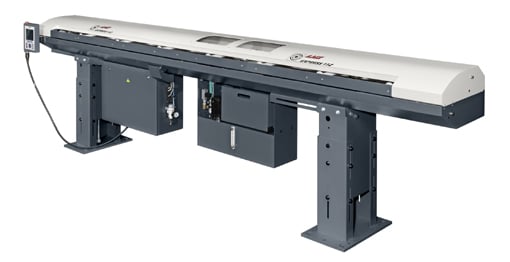How does this sound to you machinists? A tried and tested yet innovative and sustainable solution on your sliding headstock automatic lathes that achieves maximum efficiency through high pressure quickly and smoothly – without having to re-train your employees or adjust your processes every time? Or even risk stoppages because of less than perfect machine communication? Both in the initial equipment and when retrofitting?
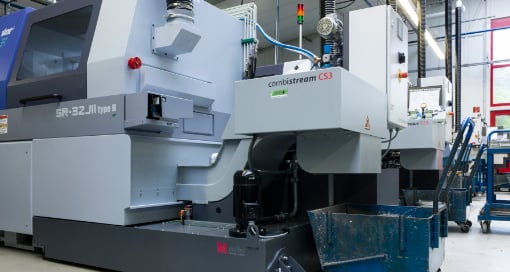
STAR SR-32 with combistream CS3
High-pressure solutions from Müller have long since turned such lofty aspirations into reality for well over 80% of the sliding headstock automatic lathes from leading manufacturers Citizen, Star, Tsugami and Tornos. The “required profile” referred to at the start has literally been determining and guiding the destiny of Müller compact high-pressure – from development through sales and production to service. But how can a peripheral equipment manufacturer really take this aspiration, this goal, into account? Especially today, when the machining industry is confronted with processes that are becoming increasingly complex? With the steadily increasing demands of the (further) processing industries with regard to materials, tolerances, and finishing? With the highly diverse and sometimes variable volumes of chips and contamination? And a technological change, especially in control and automation, that is very difficult to keep pace with?
The key – a clever modular system and permanent collaboration “We are only able to serve our customers in this way today because we have concentrated for many years on taking the initiative in approaching machine manufacturers. At the same time, we have always been pro-active in grappling with the real needs out there in the factories, something that we are still doing. We don’t just look at our technologies, but always consider the entire process, so that we can really understand in detail what is actually happening on the machine. By working in this way, we have created a modular system of systems and technologies as the basis for our idea of system partnerships”, explains Martin Müller, the Managing Director of Müller. “For three years now, we have been at the point where machine manufacturers are already including us directly in the development process at a very early stage and are constantly aligning and adapting our modular system to innovations. We are in permanent, close contact. A great deal of mutual trust is required for this way of working and these system partnerships. And these adaptations are always accompanied by a corresponding investment from us, of course. But this is the only way that our customers can benefit quickly and holistically from advances in technology.”
Building on the basic combiloop and combistream systems, fundamental components have been defined and transferred to a modular system – the thinking behind which is comparable with a module principle, only more complex. The modular system of components covers all the relevant key technology areas, from low-pressure and high-pressure technology and filtration technology, to control technology to chip conveying technology in combistream. The development period can be as long as twelve months, depending on the product category of the system. With combistream in particular, the expense of such an adaptation is almost the same for Müller as a new development: The first step is for a team, comprising Müller product manager and development staff and the responsible parties at the partner company, to develop a relevant requirements specification and from this, a concept that meets the requisite criteria and which is aligned to the new sliding headstock automatic lathes. It takes a further three to four months to arrive at the first prototype. This is because appropriate tanks have to be designed and made that fit the new lathe perfectly and take the place of the machine tank. Once the accuracy of the fit has been tested and adjusted if necessary, the prototype is given a field test. After final amendments, the new unit can start series production.
The definition of a modular system of technologies is complex, because of
- the number of machine types in different designs,
- the large number of machining methods and materials, as well as the fact that the high-pressure systems have to take into account highly diverse chip volumes, and
- the tools and toolholders that are used and the manner in which high pressure is integrated into the machine.
So it is necessary to know and master the right technologies for the highly diverse combinations of the stated parameters, as well as to combine the components in such a way that they produce an especially compact overall system. In addition, the following applies: “Looking into the future: Industry 4.0 can only be implemented in the form of a close system partnership”, says Managing Director Jürgen Müller.
We start where others stop Jürgen Glaser, DACH Marketing Director at Müller, points out that system partnerships are far more than just co-operations for development: “The user, the machinist, usually wants a self-contained, coordinated and validated overall system – often from a single source as well. Our system partners cannot always be experts on all the different peripheral devices, from suction, to fire protection, to inflow systems. Here at Müller, we are quite simply the high-pressure piece of the puzzle, with the machine manufacturers benefiting from our experience of high-pressure systems and chip management. Consequently, they are able to offer their customers a balanced solution.” So logically, Müller also qualifies the system partners with regard to the key technologies, the combiloop and combistream system solutions and their design. Easily comprehensible and highly relevant instruments are also developed and provided, to simplify order entry and above all, to allow optimum alignment of the high-pressure peripheral equipment to customer requirements during initial discussions.
The system partner sales force uses a checklist, for example, to record the specified parameters relating to the relevant factors – that is, material, chip volume, machining, etc., – together with their customer. As a result, the final configuration of the components of the modular system is created in relation to the order.
“With this way of working and the holistic consideration of the process, we create efficiency and certainty across the entire value and distribution chain. It’s obvious: here at Müller, we are more effective when it comes to delivery times and we keep simplifying order entry and design in the complex issue of high-pressure filtration, trying to minimise incorrect designs and problems in integration and operation right from the start. Both system partners and end customers also benefit from the performance of additional services – including system commissioning. In the end, the experience we have gained from the front line never stops influencing our products and the respective modular systems of our partners. It is a win-win situation, with the goal of making the advantages of our high-pressure systems accessible to machinists quickly and reliably”, says Alexander Lang, Product Manager at Müller, by way of explanation. He then adds: “The system partnership and the machine-specific, comprehensive modular system have a further, crucial advantage for the customer: compactness! That is, the optimum use of space, in conjunction with efficiency and performance, of course. Because when space is tight, standard systems, standard modular systems and high-pressure systems that cannot be individualised on this scale, reach their limits immediately.”
